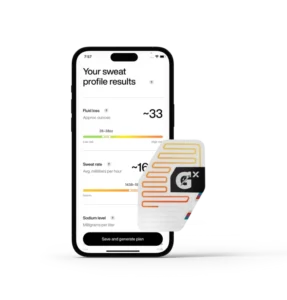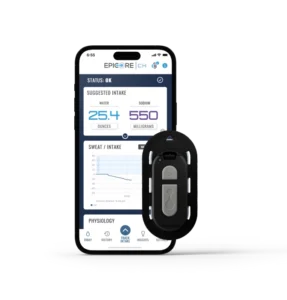Sweat Monitoring Technology: The Future of Non-Invasive Health Tracking
Sweat monitoring technology is revolutionizing how we approach personalized health management, offering a non-invasive alternative to traditional blood-based diagnostics. Recently featured in Longevity Technology Magazine’s article “Sweat Monitoring: The New CGM,” Epicore Biosystems stands at the forefront of this breakthrough field, transforming how athletes, workers, and healthcare providers monitor critical health biomarkers through advanced wearable biosensors.
How Sweat Analysis Technology Works
Wearable microfluidic sensors represent a paradigm shift in continuous health monitoring. Unlike traditional diagnostic methods that require invasive blood draws, sweat analysis provides real-time insights into hydration status, electrolyte balance, and emerging biomarkers for kidney health, hormonal changes, and metabolic conditions. According to groundbreaking research published in Nature Digital Medicine, these wearable microfluidic biosensors can continuously monitor hydration biomarkers and some solutions, like Connected Hydration, can also provide haptic feedback to users when critical thresholds are reached.
The technology utilizes sophisticated microfluidic channels embedded with electrode arrays that measure whole-body fluid loss, perspiration rate, sodium concentration, and sodium loss in real-time. Advanced algorithms process this data alongside temperature sensors and accelerometer readings to provide comprehensive physiological insights that were previously impossible to obtain through non-invasive means.
From Northwestern Research to Global Innovation
Epicore Biosystems’ sweat monitoring technology traces its origins to pioneering research conducted in Professor John A. Rogers’ laboratory at Northwestern University. This foundational work, detailed in Science journal, established the scientific principles behind microfluidic “lab-on-skin” devices—flexible, wearable sensors capable of capturing and analyzing sweat biomarkers with laboratory-grade precision.
The transition from academic research to commercial application demonstrates how cutting-edge materials science and bioengineering can address real-world health challenges. The Northwestern research team’s innovations in flexible electronics and microfluidic systems created the technological foundation that enables continuous, comfortable monitoring without the discomfort or inconvenience of traditional diagnostic methods.
Proven Applications Across Industries
Athletic Performance Optimization with Gx Sweat Patch
Epicore’s collaboration with Gatorade resulted in the development of the Gx Sweat Patch, a consumer-focused wearable sensor that provides personalized hydration insights for athletes. This innovative device tracks sweat sodium concentrations and fluid loss rates, enabling precise hydration strategies that optimize athletic performance and accelerate recovery.
The Gx Sweat Patch represents the first commercially successful application of sweat analysis technology in sports science, demonstrating how wearable biosensors can translate complex physiological data into actionable recommendations for individual athletes. By monitoring electrolyte loss patterns during training and competition, athletes can develop personalized hydration protocols that maintain optimal performance while preventing dehydration-related performance decline.

Gatorade Gx Patch – developed by Epicore Biosystems
Industrial Safety and Worker Protection
Recognizing the broader applications of sweat monitoring technology, Epicore evolved its platform into the Connected Hydration system, specifically designed for industrial environments where worker safety is paramount. Research published in conference proceedings demonstrates how continuous personal monitoring and personalized hydration recommendations can effectively prevent occupational heat stress.
Real-world deployments with global enterprises including Chevron in California and United Airlines in Guam among others have validated the technology’s effectiveness in preventing dehydration and heat-related illness. These implementations have demonstrated measurable improvements in worker safety, productivity, and overall health outcomes, establishing sweat analysis as a critical tool for occupational health management.

Connected Hydration Patch and App – developed for Industrial applications
Scientific Validation and Research Leadership
Epicore’s commitment to scientific rigor distinguishes the company in the rapidly evolving wearable sensor market. The technology’s effectiveness is supported by extensive peer-reviewed research published in prestigious journals including Science and Nature, establishing a foundation of credibility that sets Epicore apart from competitors.
The Nature Digital Medicine publication specifically validates the accuracy and reliability of Epicore’s wearable microfluidic biosensors in real-world conditions, demonstrating their ability to provide clinically relevant data for hydration management and heat stress prevention. This scientific backing ensures that healthcare providers, safety managers, and athletes can trust the technology’s recommendations for critical health and safety decisions.
The Future of Biomarker Detection
Sweat monitoring technology continues to evolve beyond basic hydration tracking toward comprehensive health assessment. Epicore is actively exploring new frontiers in biomarker analysis, targeting indicators for kidney health, hormonal changes, and metabolic conditions that could revolutionize preventive healthcare.
Emerging research suggests that sweat contains a wealth of biomarkers previously accessible only through invasive blood testing. These include stress hormones, inflammatory markers, and metabolic indicators that could enable early detection of health conditions before symptoms appear. The non-invasive nature of sweat analysis makes continuous monitoring feasible, opening possibilities for proactive health management that was previously impossible with traditional diagnostic methods.
Technology Advantages Over Traditional Methods
Wearable sweat sensors offer several compelling advantages over conventional health monitoring approaches. Unlike blood-based diagnostics that provide only point-in-time snapshots, sweat analysis enables continuous monitoring that captures physiological changes throughout daily activities, exercise, and work environments.
The real-time data collection capability allows for immediate interventions when health parameters exceed safe thresholds, rather than waiting for scheduled medical appointments or laboratory results. This immediate feedback loop is particularly valuable for preventing heat-related illness in industrial settings and optimizing performance in athletic applications.
Additionally, the non-invasive nature of sweat analysis eliminates the discomfort, infection risk, and logistical challenges associated with repeated blood draws, making continuous health monitoring practical for everyday use rather than limited to clinical settings.
Expanding Market Applications
The versatility of sweat monitoring technology positions it for expansion across multiple healthcare and wellness sectors. Beyond current applications in sports and industrial safety, emerging opportunities include clinical research, elderly care monitoring, and consumer wellness applications that could democratize access to personalized health insights.
Healthcare providers are increasingly recognizing the value of continuous monitoring data for managing chronic conditions, optimizing treatment protocols, and identifying health trends that might be missed through periodic clinical visits. The ability to collect objective physiological data in patients’ natural environments provides unprecedented insights into how lifestyle factors, medications, and environmental conditions affect individual health outcomes.
Discover more about Epicore Biosystems’ groundbreaking sweat monitoring technology and its applications across industries. Read the complete feature highlighting Epicore’s innovations in Longevity Technology Magazine and explore the scientific research that validates this revolutionary approach to personalized health monitoring.